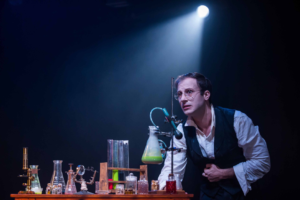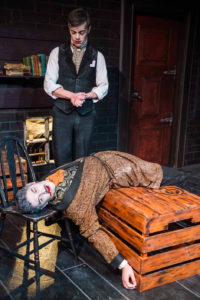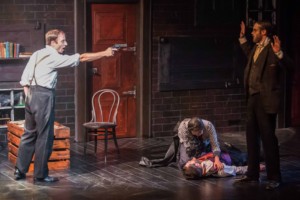By Robert Louis Stevenson, adapted by Noah Smith. Castle Hill Players. The Pavilion Theatre Castle Hill. Jan 31 – Feb 22, 2020
Reviewed : January 27, 2020

Robert Louis Stevenson’s macabre novella about a dual personality, one good, one evil, was first published in early 1886. A year later the first adaptation for the stage opened in Boston. Many adaptations have followed, both on stage and screen. This adaptation by American playwright Noah Smith is a chilling science fiction thriller that demands meticulous direction, precision acting and accurate, split-second sound and lighting operation.
Director Paul Sztelma’s production at the Pavilion achieves all three. The action is fast, exacting. The characters are strangely disturbing. The lighting and sound effects, created by Sean Churchward and Bernard Teuben, are menacing, sinister. Theatrical teamwork such as this relies on trust and dependability, consistency and confidence. The sort of collaboration one expects of professional theatre – and this production is probably as close to that as community theatre gets.
Sztelma sets the play along a tall, dark diagonal wall. Small, high windows draped in cobwebs allow in eerie, angled light. Large wooden crates, three chairs, a laboratory bench are the only furnishings. The stage is gloomy, bathed in an eerie haze. Two doors become symbolic of Jekyll’s dual personality … and the places it leads him.

On this set, his cast move with rigorously rehearsed precision, their characters clearly delineated, their voices clear, their emotions tightly contained. The atmosphere they create is scarily surreal. Their ethereal faces emerge from shadows with an unnatural glow. Their costumes, designed by Annette van Roden, meld with the darkness of the set. They are immaculately of the period, but are sombre, a little dusty, almost ghostly.
Dimitri Armatus plays Jekyll – and Hyde – transforming on stage from one to the other in a series of contortions and cries that are alarmingly unnerving. As Jekyll he is social, amiable but sometimes a little remote, a little unbalanced. As Hyde he is just the opposite: scarily energetic, deranged, controlled by the evil that drives him. Sustaining two such disparate characters is a challenge that Armatas meets with strong, convincing realism, finding the very different dimensions of each clearly and believably.
Scene changes occur accompanied by ominous sound effects and rapid lighting cues. With a clunk as if from a huge camera shutter, the stage is plunged into momentary darkness. From the mist two gothic chorus characters emerge in shadowy light. Together, as saturnine narrators, they move the grisly tale along – and, in so doing, establish the necessary pace of the action.
Nicole Hardwood and Robert Snars work in perfect tandem in these roles – and many supporting roles, including the pernicious voices that whisper in Jekyll’s head. Whether working from opposite sides of the stage, with light jumping from one to another, or re-setting chairs as they take the audience to the next scene, they are in tune, biting cues fiercely, relating to each other as closely as if they themselves, like their master, are also two parts of a whole.

Jekyll’s trio of friends are played by Hamish Macdonald (Hastie Lanyon), Jonathan Burt (Gabriel Utterson) and Adam Garden (Richard Enfield). Though these characters represent learned respectability, each has flaws that come to light with the effects of Jekyll’s transformations. All three actors sustain the pace that the rising tension of the production demands – and their frailties reveal the ‘good and veil’ that Jekyll (and Stevenson) believed is intrinsically part of the human personality.
Faith Jessel is Cybel, a socially aware prostitute who is the symbol of Enfield’s failing, but is Hyde’s champion. Sassy, in lacy red knickers and black fishnet, Jessel finds the feistiness of the less ‘respectable’ aspects of Victorian society.
Enfield’s fiancée, Helen, is played by Vanessa Purnama, who depicts Helen’s growing confusion with the turmoil in which she has become involved.
Sztelma’s production is indicative of the creative talent that abounds outside the mainstream theatrical scene. Directors, actors, designers, operators who live their ‘other lives’ rehearsing, building sets, developing effects, to bring performances such as this to community theatres across the country.
Get to see this one! Take the new Metro line to Hills Showground – the theatre’s just up the road from the station and trains run late into the night.
Also published in Stage Whispers magazine.